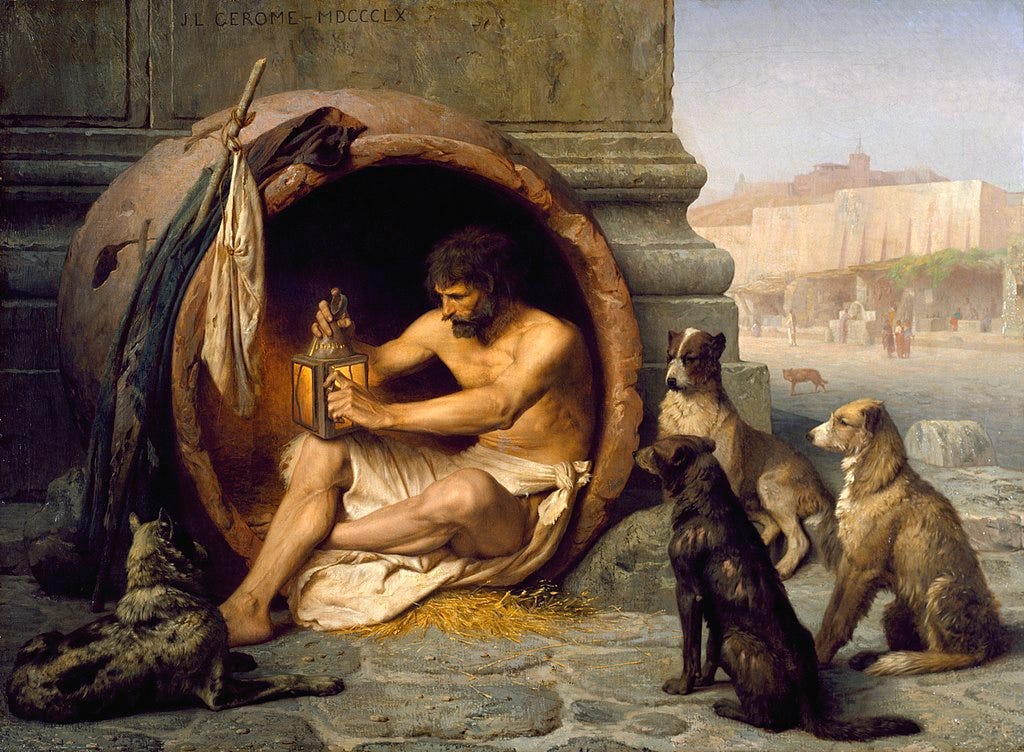Seneca's letter no. 20, part II: despising wealth
If you are familiar with Seneca's letters from reading one of the many editions not containing all of them, you almost certainly do not know letter no 20. The reason that it is not included in selections is - most likely - that it seem to consist of parts of two letters pieced together. In the first part Seneca talks about the importance of having an internally consistent set of values. He then, quite abruptly, talks about how important it is for our tranquility that we become able to sustain ourselves on a bare minimum.
Obviously, this is the kind of talk that has lead a lot of people to accuse Seneca of being a hypocrite - since he was one of the richest men in Rome when he wrote those lines. However, Seneca's position is not that it is contrary to Stoicism to possess wealth but that it is paramount that we do not make our happiness depend on any amount of wealth large enough to make us fear losing it. As he puts it in letter 18.13:
“I do not forbid you to possess wealth; I only seek to make you fearless in possessing it”.
Fear is to expect future pain. The fear of poverty is the fear of not being able to sustain ourself - and not being able to support anyone who might depend on us. Seneca is making the point that it is not painful to live a life based on natural needs and that if we do so we are well on our way to eradicate the fear of poverty.
The flock of dependents Seneca talks about below is not our family. He is talking about slaves and other servants and probably also of clients. In other words, Seneca's contemporary readers were encouraged to withdraw from some of the most fundamental aspects of what it meant to be a privileged Roman. That we don’t have slaves and clients now does obviously not mean that Seneca is not talking to us.
“You say, "What will happen to my flock of dependents if the family does not have an income?" Once you stop feeding that flock, it will feed itself. Or else poverty will teach you what you cannot teach yourself: your real, true friends will stay by you even then, while anyone who was not clinging to you but to something else will depart from you. Should we not love poverty for this if for nothing else? It will show you who your friends are. O, when will that day come when no one will lie to you for the sake of the office you hold! Therefore leave every other prayer in God's hands, and direct your thoughts, your cares, your wishes, to this alone: contentment with yourself and with the goods that come from yourself. What prosperity could be nearer at hand? Trim yourself back to that small fortune that chance cannot take away. And to make that easier for you to do, this letter's remittance will make reference to it. I'll deliver that immediately. Although you may complain, my payments are still to be made, quite willingly, by Epicurus:
“Believe me, your speech will be more impressive on a pallet and in shabby clothing.
Then, you won't only be speaking; you'll be proving what you say”.
I certainly hear the words of our friend Demetrius differently after seeing how he slept: not only without a mattress but even without a blanket! He doesn't just preach the truth; he gives testimony to it. "What's this? Can't one despise wealth while it is in one's pocket?" Why not? There is greatness of spirit also in the person who sees wealth heaped up around him and laughs long and loud for sheer amazement that it has come to him. Others tell him it is his; on his own he scarcely realizes it. It is a great thing not to be corrupted by living amid riches; great is the man who is a pauper in his wealth. You say, "I do not know how such a man would bear poverty if he should come into it." Nor do I know, Epicurus, whether your boastful pauper would scoff at wealth if he should come into it. So we must evaluate the mind of each, and examine them to see whether the one relishes his poverty and whether the other declines to relish his wealth. Otherwise the pallet and shabby clothes are but little proof of good intent, if it is not also apparent that the person is enduring them by preference rather than of necessity. But it is a promising sign when a person does not rush out to get them as if they were better clothes, yet still prepares himself for them as easy enough to bear. And it is easy, Lucilius; in fact, when you have rehearsed for it long before, it is enjoyable too. For there is something in such garments without which nothing else is enjoyable: there is tranquility.
So I think it is really necessary to do what I told you in my letter great men have often done: set aside some days when by making a pretense of poverty we train ourselves for the real thing. We should do it all the more since we are steeped in luxuries, and think everything harsh and difficult. Better to wake the mind from sleep; pinch it, and remind it of how little our nature actually requires. No one is born rich: everyone who comes forth into the light is ordered to be content with milk and a bit of cloth. From such beginnings do we come, and yet now whole kingdoms are not big enough for us!"
- Seneca, Letters 20.7-13



